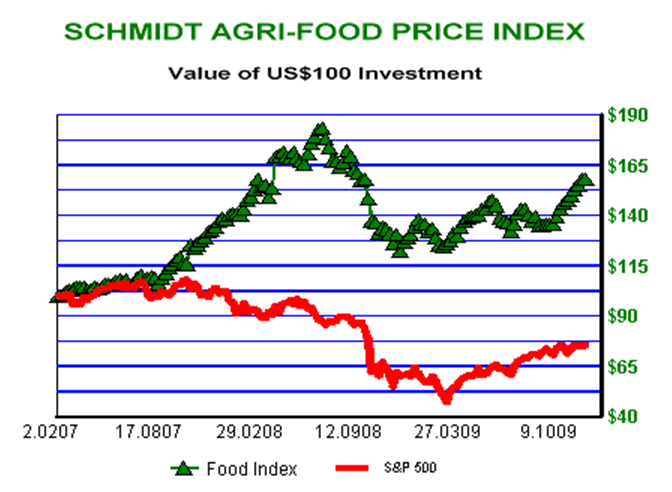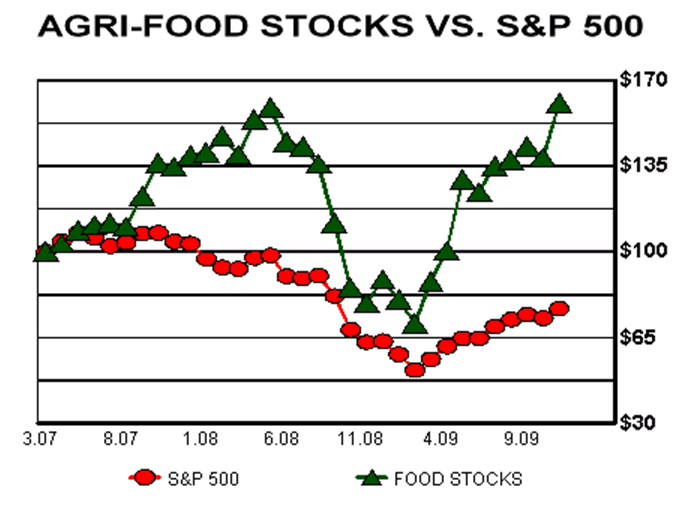Agri-Food Companies Are a Good Contrast with Gold stocks
Commodities / Agricultural Commodities Nov 30, 2009 - 04:43 PM GMTBy: Ned_W_Schmidt
 Over the Thanksgiving holiday driving I-95 in Florida provided some insight into the state of at least some segments of the U.S. economy. I-95 is the major North-South highway on the East coast of Florida. It runs from Miami to Georgia. Driving it from mile marker 47 to about mile marker 300 provides a fairly complete sample of travel activity in the state. Travel activity in Florida is a reflection of economic activity within the nation.
Over the Thanksgiving holiday driving I-95 in Florida provided some insight into the state of at least some segments of the U.S. economy. I-95 is the major North-South highway on the East coast of Florida. It runs from Miami to Georgia. Driving it from mile marker 47 to about mile marker 300 provides a fairly complete sample of travel activity in the state. Travel activity in Florida is a reflection of economic activity within the nation.
First, traffic was non existent. Both legs of the round trip were made in record time. More interesting though was the price of gasoline. Normally, the best price on gasoline on my weekly route is in Davie, west of Fort Lauderdale. Tuesday the tank was charged for the trip. On the highway returning home, gasoline was purchased cheaper on the interstate than in Davie. That gasoline on that major highway was cheaper than at home suggests demand for gasoline is extremely weak in Florida. One would also have to conclude that the U.S. economy is far weaker at the grass roots level than government statistics and economists' forecasts suggest.

Travel is discretionary spending, and U.S. travel no longer involves the economic epicenter of the world. That position has been assumed by China, et al. While China will not replace the North America as the largest economy in the world immediately, it will do so at the margin which is what matters. The incremental economic growth of China, et al has been and certainly will exceed the marginal contribution of North America which has been hamstrung by wealth destroying Keynesianism. Past Chinese economic growth has generated higher incomes. Future growth in the economy of China, et al will generated further growth in income. And to make it simple, people with more money in their wallets eat better.
Our first chart this week, above, is of an index of Agri-Food prices relative to the S&P 500. The trend in Agri-Food prices is a visible manifestation of the shift in dominance from supply to demand. These prices represent true economic transactions. In each, someone is buying Agri-Food products from someone selling them. As that picture portrays, the fundamentals for Agri-Food, as measured by prices, seem healthy. The hedge fund induced mania of last year has passed, allowing demand to again dictate prices.
When looking at a chart of the price of an Agri-Food, like rice or corn or cotton, keep in mind that these prices represent true economic transactions. When one buys a share of IBM stock, no meaningful economic activity occurs. Someone takes an old share of IBM from their inventory, selling it to you. That IBM stock is then deposited in your inventory of other old IBM shares.
When someone buys a bushel of corn or a hundredweight of rice, a far different situation occurs. Whoever buys that grain intends for it to be consumed by someone. Grains and meats are not purchased to be put in inventory for a future trade, like IBM stock. Ultimately, that grain or meat or oils will be consumed. They will disappear.
That rising trend for Agri-Food prices, shown in the first chart, is a visual manifestation of rising consumption of Agri-Foods meeting a rather inelastic supply situation. The supply of Agri-Food cannot rise much in the short-term. Agri-Foods are not produced in a factory, but grow in a field generally one time a year. Pictured in that chart are the essential fundamentals of Agri-Food.
In recent years, the supply situation has deteriorated while demand continues to expand. Agri-Food production actually rose in 2008 while prices were pushed higher in the hedge fund induced mania. However, global Agri-Food production likely fell in calendar 2009. Reports to date would also suggest that global Agri-Food production will likely decline in calendar 2010. Agri-Food supply is a far more complex situation than producing consumer electronics.

In our second chart, above, we find that some have already benefitted from the continued positive developments in the Agri-Food sector. Plotted in that chart is an index of a basket of Agri-Food stocks versus the S&P 500. The results need little elaboration.
Strongest components of that basket of Agri-Food stocks have been those companies with exposure to China. You remember China, the nation predicted every month by someone to be on the verge of economic collapse. Well, guess it did not collapse yet. Agri-Food companies in China have experienced a slowing rate of growth, but nothing approaching collapse. The day of this writing another story laying out the case for China's imminent collapse was read, so presumably the situation is secure for the next month.
Not as strong have been those Agri-Food companies based outside of China. Revenues were hurt by the collapse of the hedge fund induced price mania of last year and the Western economic recession. The third calendar quarter likely was the low point for their year-to-year comparisons. That combined with the less strong move in the price of these stocks suggests that Agri-Food companies based outside of China may perform quite nicely in the near future. All should do well, though, over the coming decade.
Agri-Food companies are a good contrast with Gold stocks. Gold mining companies are attempting to deplete their resource base. The goal of mining is to take the Gold out of the ground and sell it. Agri-Food activities are all about maintaining a renewal resource, and profiting each year from the production. Further, developments in China and India suggest that the next decade will be good for the Agri-Food sector as rising demand meets inelastic supply. What happens after the next decade we will worry about later. To begin your exploration of Agri-Food use this link: http://home.att.net/~nwschmidt/Order_AgriValueRECENT.html
The response to the release of 3rd Annual U.S. Agricultural Land As An Investment Portfolio Consideration, 2009 is much appreciated. This work is the definitive annual study of the role of U.S. agricultural land in an investment portfolio. It is a rigorous statistical analysis suitable for the sophisticated investor. The 60 page PDF file is delivered via email, and is available at the following link: http://home.att.net/~nwschmidt/OrderAgriLand2009.html
By Ned W Schmidt CFA, CEBS
AGRI-FOOD THOUGHTS is from Ned W. Schmidt,CFA,CEBS, publisher of The Agri-Food Value View , a monthly exploration of the Agri-Food grand cycle being created by China, India, and Eco-energy. To receive the most recent issue of this publication, use this link: http://home.att.net/~nwschmidt/Order_AgriValue.html
Copyright © 2009 Ned W. Schmidt - All Rights Reserved
Ned W Schmidt Archive |
© 2005-2022 http://www.MarketOracle.co.uk - The Market Oracle is a FREE Daily Financial Markets Analysis & Forecasting online publication.



